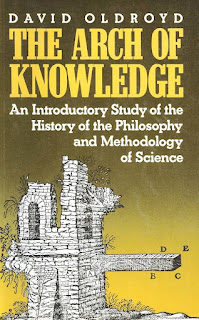The Arch of Knowledge

I borrowed the title of this blog from a book by the late David Oldroyd (1936-2014). The major theme of the book is a reference to the ancient idea of a two-fold pathway to knowledge: analysis, from observation to general first principles, and synthesis, deduction from those principles back to observables. I think that keeping in mind this framework will help us make sense of the various knowledge dimensions in the current debate around and beyond the role of the philosophy of science. The whole history of modern philosophy of science is primarily the history of the working out of the implications of severing from this arch one of the legs or the coping-stone. Let's see an example taken by Oldroyd. Enter Popper. He has basically proposed, for the left leg, to take a run and jump, that is to say, you formulate hypotheses as it were by guesswork and test by experiment the conclusions that flow deductively from these. This method virtually ignores the ascending side ...
